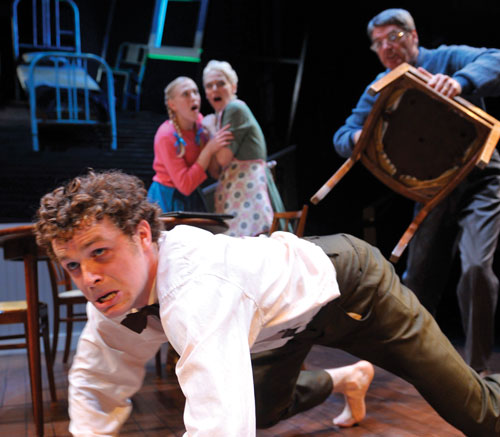arts@sfbg.com
THEATER The story of earnest young traveling salesman Gregor Samsa, who awakens one morning to discover he has changed into something he and his family can only describe as vermin, Kafka’s 1915 novella The Metamorphosis has undergone a number of metamorphoses of its own in terms of adaptations for stage and screen. One of the latest is the lauded 2006 interpretation by actor Gísli Örn Gardarsson and director David Farr, a coproduction between Iceland’s Vesturport Theatre and England’s Lyric Hammersmith that debuted in London and made its U.S. premiere at the Brooklyn Academy of Music last winter.
Berkeley’s Aurora Theatre offers the first wholly American production of this stage version, under the direction of Bay Area playwright-director-actor Mark Jackson. The production has many fine features, but the balance between the social and emotional content of the story and its abstract or absurdist framework gets skewed a bit too far toward the latter.
Jackson’s production stakes out its own territory by eschewing the Nazi-era periodizing of the original Vesturport–Lyric Hammersmith production. This Metamorphosis is set in the American 1950s — although the trappings of that place and time are only vaguely evoked here. Indeed, the costumes, semi-abstract split-level set, and heightened performance style together seem a blurry blend of Germanic petit bourgeois culture, high modernism, and Leave It to Beaver-esque TV surreality.
A horror and embarrassment to his family, Gregor (a winningly agile and sympathetic Alexander Crowther) confines himself most of the time to a variety of perches in his second-floor room — an environment rendered via a striking modernist pop-out painting and vertical jungle gym by Nina Ball. Its spare features are all askew and rotated forward on a sloped, accordion-like set of ridges, a veritable waterfall of steps supporting an elongated metallic bed frame and the creeping, scrambling Crowther.
Formerly the main breadwinner of his downwardly mobile lower-middle-class family, Gregor does not report for work one day. It’s that day, of course, that he drops so far in the estimation of his family that he is no longer even comprehensible to them, no longer even human. They instinctively side with his overbearing employer (Patrick Jones) and consider their own plight now that they must fend for themselves. Only his beloved sister Grete (Megan Trout) makes a serious attempt at communication and sympathy, although with melancholy results.
Grete is the key figure in this brisk 80-minute stage adaptation. Her brother’s transformation entails her own, from a would-be dancer into an eligible commodity in the material calculations of her desperate family and finally into a self-possessed agent in the cold material world. Trout is sharp but perhaps too perky and superficial in the role, since the anguish Gregor feels at seeing her metamorphose doesn’t have the same impact in the absence of a convincing sibling bond. Gregor clearly lives vicariously through the promise of Grete’s freedom, her life as an artist. When that dies, when she is transformed, his own demise is complete.
Gregor’s parents (played with sure satirical exaggeration but, again, little beyond comic anguish by Madeline H.D. Brown and Allen McKelvey) also feel too distant from it all. The cast offers little coherence as a family, albeit a fractured one. Instead we get a nicely wrought metaphor without much of a sense of its stakes, a lost opportunity and no doubt an unintended consequence. Bosses and subhumans, marriage as sexual commerce, art as perversion, the quiet everyday destruction of personality, the corruption of the closest social bonds by vast coercive hierarchies of power and authority — Jackson’s right, you don’t need to go back to Nazi Germany to find all that. It should all feel closer to home. *
METAMORPHOSIS
Through July 17
Wed.–Sat., 8 p.m.; Tues. and Sun., 7 p.m.;
Also Sun., 2 p.m., $10–$55
Aurora Theatre
2081 Addison, Berk.
(510) 843-4822

